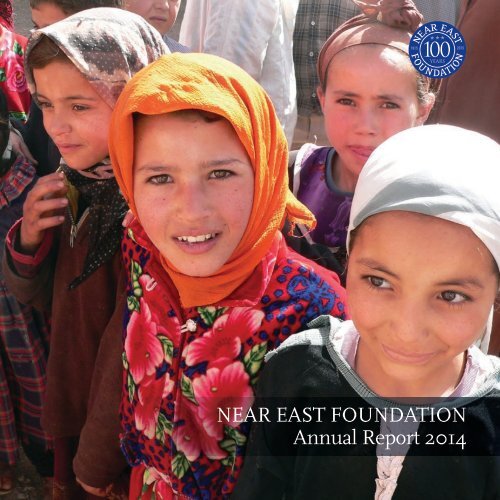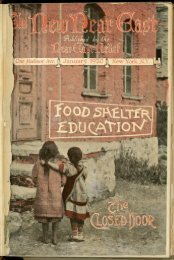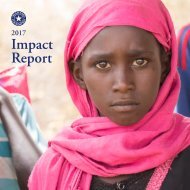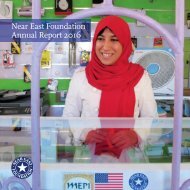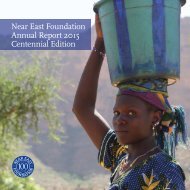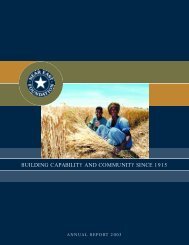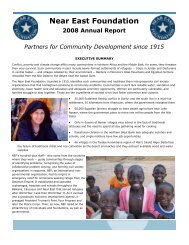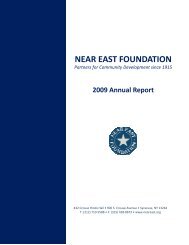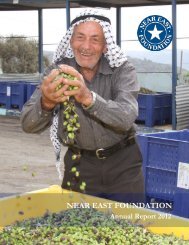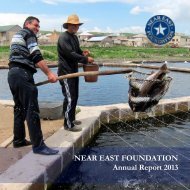Near East Foundation Annual Report 2014
Create successful ePaper yourself
Turn your PDF publications into a flip-book with our unique Google optimized e-Paper software.
NEAR EAST FOUNDATION<br />
<strong>Annual</strong> <strong>Report</strong> <strong>2014</strong>
BOARD OF DIRECTORS<br />
Shant Mardirossian, Chair<br />
Johnson Garrett, Vice Chair<br />
Haig Mardikian, Secretary<br />
Charles Benjamin, Ph.D., President<br />
Mehrzad Boroujerdi, Ph.D.<br />
Mona Eraiba<br />
Alexander Ghiso<br />
Jeff Habib<br />
Linda K. Jacobs, Ph.D.<br />
Amr Nosseir<br />
Matthew Quigley<br />
Soroush Shehabi<br />
Robert Solomon<br />
William Sullivan<br />
Harris Williams<br />
ACADEMIC COUNCIL<br />
John Kerr, Ph.D.<br />
John McPeak, Ph.D.<br />
Thomas Mullins<br />
Juliet Sorensen, J.D.<br />
Michaela Walsh<br />
HONORARY BOARD<br />
Shahnaz Batmanghelid<br />
Amir Ali Farman-Farma, Ph.D.<br />
John Goelet<br />
John Grammer<br />
Ronald Miller<br />
David Mize<br />
Abe Moses<br />
Richard Robarts<br />
Anthony Williams<br />
Tarek Younes<br />
PRESIDENT’S COUNCIL<br />
H.E. Andre Azoulay<br />
Ian Bremmer<br />
Ambassador Edward P. Djerejian<br />
Vartan Gregorian, Ph.D.<br />
Ambassador Richard W. Murphy<br />
Her Majesty Queen Noor of Jordan<br />
James Steinberg<br />
Ambassador Frank G. Wisner<br />
On the Cover: Schoolgirls in Morocco’s High Atlas Mountains.
NEAR EAST FOUNDATION<br />
<strong>Annual</strong> <strong>Report</strong> <strong>2014</strong>
<strong>Near</strong> <strong>East</strong> <strong>Foundation</strong> at 100: Celebrating the Past, Shaping the Future<br />
<strong>Near</strong> <strong>East</strong> Relief orphans<br />
at Antylas - lesson on the<br />
beach, c. 1920s.<br />
This year marks the 100th anniversary<br />
of the founding of <strong>Near</strong> <strong>East</strong> Relief, as<br />
the <strong>Near</strong> <strong>East</strong> <strong>Foundation</strong> was known<br />
originally, which was created in 1915<br />
to help rescue an estimated 1.5 million<br />
Armenian refugees and orphans after the<br />
collapse of the Ottoman Empire at the<br />
outbreak of World War I. Upon learning<br />
of the refugees’ plight, President Woodrow<br />
Wilson asked his friend and college<br />
roommate, Cleveland Dodge, to help<br />
raise money for a rescue mission. Dodge<br />
pulled together a group of prominent<br />
businessmen and politicians to form the<br />
American Committee for Armenian and<br />
Syrian Relief, which officially became<br />
<strong>Near</strong> <strong>East</strong> Relief after an act of Congress<br />
in 1919.<br />
Through <strong>Near</strong> <strong>East</strong> Relief chapters<br />
in every major American city and state,<br />
thousands of ordinary citizens and school<br />
children collected supplies and donated<br />
money to a fund that raised $117 million<br />
over 15 years to help a generation of<br />
Armenians, Greeks, and Assyrians survive<br />
genocide—including 132,000 orphaned<br />
children. <strong>Near</strong>ly 1,000 relief workers<br />
volunteered to go to the region to offer<br />
food, medical care, and educational and<br />
vocational training for adults and children.<br />
This heroic effort marked the first great<br />
outpouring of American humanitarian<br />
assistance—giving birth to citizen<br />
philanthropy, a movement that embodies<br />
the idea that average people can make a<br />
difference to those in need in far-away<br />
places.<br />
What began as an urgent call for<br />
humanitarian assistance a century ago has<br />
gone on to become one of the most highly<br />
respected non-governmental organizations<br />
in the world dedicated to transcending<br />
national and religious barriers to help<br />
vulnerable populations in the Middle <strong>East</strong><br />
and Africa improve the quality of their<br />
lives. Because of its deep relationships<br />
and longstanding commitment to the<br />
region, NEF is able to work in parts of the<br />
globe where few others have been able to<br />
succeed. With 100 percent of its field staff<br />
native to the countries in which they work,<br />
NEF will continue to impact millions of<br />
lives for many years to come.<br />
<strong>Near</strong> <strong>East</strong> Relief Historical<br />
Society<br />
In <strong>2014</strong>, NEF created the <strong>Near</strong> <strong>East</strong><br />
Relief Historical Society to raise<br />
awareness about this important<br />
chapter in American history. The<br />
Society is dedicated to preserving<br />
and reconstructing the relief effort’s<br />
archives and sharing its remarkable<br />
history through a traveling exhibit and<br />
comprehensive online museum and<br />
archive. It will pay tribute to <strong>Near</strong> <strong>East</strong><br />
Relief’s founders and relief workers,<br />
the beneficiaries of the organization’s<br />
groundbreaking work, and the<br />
humanitarian and philanthropic<br />
tradition that endures to this day.<br />
The Society’s initiatives will ensure<br />
that the history of <strong>Near</strong> <strong>East</strong> Relief is<br />
safeguarded for future generations.<br />
www.neareastmuseum.com<br />
NEF <strong>2014</strong> <strong>Annual</strong> <strong>Report</strong> | 4
Barclay Acheson<br />
with two orphans,<br />
Babek and Lea.<br />
Alexandropol,<br />
c. 1922.<br />
10,000 <strong>Near</strong> <strong>East</strong> Relief<br />
Orphans Greet You,”<br />
Constantinople, c. 1921.<br />
The exterior of the Birds’ Nest<br />
Orphanage, a former Druze<br />
palace in Sidon, Syria, c. 1924.<br />
Boy shoemakers,<br />
<strong>Near</strong> <strong>East</strong> Relief<br />
orphans, in<br />
Jerusalem, c. 1923.<br />
5 | NEF <strong>2014</strong> <strong>Annual</strong> <strong>Report</strong>
A Message from the Board Chair and President<br />
The <strong>Near</strong> <strong>East</strong> <strong>Foundation</strong> was created initially to mobilize<br />
assistance for those left destitute by the Armenian Genocide.<br />
As immediate humanitarian needs gave way to longer-term<br />
concerns of self-sufficiency and resilience, the organization’s<br />
early leadership and staff pioneered efforts to support<br />
communities as they rebuilt and recovered from adversity. One<br />
hundred years later, the <strong>Near</strong> <strong>East</strong> <strong>Foundation</strong> (NEF) is driven by<br />
the same purpose—to provide vulnerable and disenfranchised<br />
populations with the resources and skills needed to thrive and<br />
prosper in their own communities and economies. Today, NEF<br />
is working to create opportunities for the most vulnerable<br />
populations and to bridge divides in nine countries in the Middle<br />
<strong>East</strong> and Africa.<br />
With your support, NEF is helping people throughout the<br />
region build better lives for themselves and their families.<br />
In Jordan, refugee women from Iraq are launching small<br />
businesses to earn an income and achieve self-sufficiency,<br />
creating a model for helping other refugees reduce their<br />
dependence on foreign aid. We will soon be expanding this<br />
work to Lebanon, where Syrian refugees have fled to escape the<br />
conflict in their own country. In the West Bank, cross-border<br />
economic partnerships between Palestinians and Israelis have<br />
resulted in millions of dollars in new income—partnerships that<br />
continue to expand due to overwhelming grassroots support.<br />
In Morocco, young people are working with local government<br />
to create hundreds of new self-sustaining businesses and<br />
jobs. Through a first-of-its kind initiative in Armenia, women<br />
survivors of domestic violence are developing entrepreneurial<br />
skills to help them achieve financial independence and break free<br />
from abusive environments.<br />
As we witness another human tragedy unfolding across<br />
the Middle <strong>East</strong>—echoing the circumstances that led to the<br />
creation of NEF in 1915—it will take the collective effort of all<br />
of us working together to address the challenges that must be<br />
overcome to ensure our global welfare and security. On behalf<br />
Shant Mardirossian, board chair, and Charles Benjamin, president,<br />
at Lake Sevan in Armenia.<br />
of the Board of Directors and the entire NEF team, we thank<br />
you for being part of our work in this historic moment and for<br />
carrying on the heroic tradition of citizen philanthropy that<br />
began in America a century ago. You can be sure we are doing<br />
our best to help build a more stable, sustainable, and inclusive<br />
region of the world.<br />
Sincerely,<br />
Shant Mardirossian<br />
Board Chair<br />
Charles Benjamin, Ph.D.<br />
President<br />
NEF <strong>2014</strong> <strong>Annual</strong> <strong>Report</strong> | 6
<strong>2014</strong>: EXPERIENCE, COMMITMENT, IMPACT<br />
In <strong>2014</strong>, NEF contributed to peace, security, and economic growth during a year when the Middle <strong>East</strong><br />
and Africa continued to undergo major transitions. The results of NEF’s work in the region were real and<br />
immediate, with new jobs and businesses created, income increased, and greater food security provided<br />
through expanded production. The impacts of NEF’s work are also long term. Partner communities have gained<br />
new skills, improved governance systems and grassroots collaboration, and grown their economies.<br />
NEF is uniquely positioned in the field. Because it has been a trusted agent of change in the region for a<br />
century, NEF has a network of enduring partnerships that allow it to operate where few other organizations<br />
can gain access—war-torn communities of South Kordofan and Central Darfur, conflict-weary communities in<br />
northern West Bank, and jihadist-occupied areas of northern Mali. NEF staff collaborate with communities to<br />
develop creative solutions that help them overcome the complex challenges they face every day.<br />
NEF works within four key program objectives to help these vulnerable groups address their most pressing<br />
development challenges:<br />
• Build peace in conflict-affected communities through<br />
reconciliation, economic cooperation, and development: NEF<br />
teams focus on using the tools of economic development<br />
(e.g., value chain development, microenterprise development,<br />
sustainable natural resource management), along with<br />
livelihood and conflict management training, to promote<br />
reconciliation between groups in conflict, and the integration<br />
of “at-risk” groups (e.g., young people in peri-urban slums, excombatants,<br />
internally displaced people).<br />
• Improve food security and livelihoods of family farmers<br />
through sustainable agriculture, natural resource<br />
management and climate change adaptation: NEF programs<br />
in this area focus on development and efficient use of<br />
productive assets, with an emphasis on water irrigation and<br />
non-conventional water resources. Projects utilize scenariobased<br />
planning for resilient agricultural development and<br />
natural resource management.<br />
• Build economic and social resilience among vulnerable<br />
women through microenterprise development: NEF<br />
promotes women’s economic independence and social<br />
resilience through a focus on entrepreneurship and business<br />
management, microcredit, and microfranchises. This work<br />
is based on networks that offer business and psychological<br />
support.<br />
• Improve the participation of young people in the civic life of<br />
their communities and countries: NEF works through civil<br />
society groups to recruit, train, and organize young leaders to<br />
represent youth interests coherently and constructively and to<br />
champion actions that address youth priorities – particularly<br />
employment, which is the major preoccupation in areas where<br />
NEF currently works.<br />
The following pages highlight NEF’s work and impact in <strong>2014</strong>.<br />
7 | NEF <strong>2014</strong> <strong>Annual</strong> <strong>Report</strong>
ARMENIA<br />
NEF helps rural entrepreneurs,<br />
like this family of beekeepers,<br />
grow their businesses using<br />
local resources.<br />
Our Work<br />
The Women’s Economic Empowerment<br />
and Advocacy (WEEA) pilot project is<br />
the first initiative in the country to focus<br />
specifically on providing domestic violence<br />
survivors with opportunities to earn an<br />
income and break free from their abusive<br />
environments by starting businesses and<br />
entering the workforce. NEF has partnered<br />
with the Women’s Support Center, which<br />
provides counseling and shelter services,<br />
and Business Pareta, a leading Armenian<br />
business development agency, to place<br />
women in entry-level jobs or create<br />
microenterprises through start up grants<br />
and business training. Women have<br />
started microenterprises related to food<br />
preparation and processing, cosmetology,<br />
and handicrafts.<br />
Building upon this initiative, which was<br />
funded by the Open Society <strong>Foundation</strong>-<br />
Armenia and the Bogosian Quigley<br />
<strong>Foundation</strong>, NEF-UK has just launched<br />
a follow-on project with funding from<br />
the European Union that will expand the<br />
program to reach 200 more women in<br />
the capital city of Yerevan and three rural<br />
Armenian communities.<br />
NEF <strong>2014</strong> <strong>Annual</strong> <strong>Report</strong> | 8<br />
Direct Impact<br />
• 54 women trained in practical business<br />
management and job readiness skills.<br />
• 15 women have started businesses and<br />
24 women have secured employment.<br />
• 80 percent of participants have<br />
increased economic independence,<br />
earning up to $350 per month (an<br />
average monthly income in Armenia).<br />
• 90 percent of participants have<br />
increased self-confidence and a more<br />
positive outlook about their futures.<br />
Success Story<br />
Soon after 35-year-old Anahit* learned<br />
she was pregnant, she began receiving<br />
threats from her partner and his family<br />
who wanted her to abort the child. The<br />
relentless intimidation and fear made<br />
her life unbearable, so she sought<br />
protection in a shelter run by one of the<br />
<strong>Near</strong> <strong>East</strong> <strong>Foundation</strong>’s local partners<br />
in Armenia. By the time her daughter<br />
was born, Anahit had found work as<br />
a manicurist, but now that she had a<br />
new baby to provide for, she wanted<br />
something more, and joined NEF’s<br />
Women’s Economic Empowerment<br />
and Advocacy project. Anahit’s<br />
background in cosmetology gave her<br />
a marketable skill, and through NEF’s<br />
training sessions, she learned strategic<br />
planning and budgeting. With this<br />
new knowledge, she acquired a small<br />
grant from NEF to start her own laser<br />
hair removal business from home—a<br />
godsend for a new mother with a baby<br />
to care for.<br />
*Anahit is a fictional name used to protect<br />
her identity.
A woman creates a<br />
variety of knitted items<br />
for the small business<br />
she started with NEF<br />
training and support.<br />
A woman entrepreneur<br />
prepares frozen Armenian<br />
delicacies to sell at market.<br />
By selling her pastries at<br />
supermarkets across Yerevan,<br />
this enterprising NEF partner has<br />
achieved economic independence.<br />
A small business owner<br />
prepares Armenian meat<br />
pastries for sale in Yerevan.
JORDAN<br />
A woman entrepreneur<br />
and NEF partner proudly<br />
displays her newly established<br />
kitchenware shop in Zarqa.<br />
Our Work<br />
In a country where millions have sought<br />
refuge from multiple conflicts, NEF is<br />
helping the largely forgotten group of<br />
Iraqi refugees who fled to Jordan over a<br />
decade ago. Most have little or no source<br />
of sustainable income and are struggling<br />
to support themselves and their families.<br />
Their protracted displacement in Jordan<br />
has depleted their savings and pushed<br />
them into increasingly impoverished<br />
neighborhoods. The Enhancing Economic<br />
Resilience project, funded by the Bureau<br />
of Population, Refugees, and Migration<br />
(U.S. Department of State) supports<br />
the livelihoods of more than 700 urban<br />
refugees and poor members of host<br />
communities by strengthening their safe<br />
access to income-generating opportunities<br />
in the informal sector.<br />
Direct Impact<br />
• Four community-based organizations<br />
(CBOSs) in the city of Zarqa now have<br />
safe spaces for women to meet and are<br />
delivering gender-sensitive enterprise<br />
development programming. CBOs<br />
report improved capacity to respond<br />
to the needs of refugees and to create<br />
stronger cohesion and harmony<br />
between Iraqis and Jordanians.<br />
• 800 women and youth, including<br />
young men, were trained in<br />
microenterprise development and<br />
provided with access to startup capital,<br />
business coaching, peer networks, and<br />
marketing opportunities.<br />
• 350 Iraqis have used project-provided<br />
cash support and vocational training<br />
to invest in livelihood activities that<br />
include automotive repairs, computer<br />
maintenance, tailoring, making beauty<br />
products, informal retail/trading, carpet<br />
weaving, massage, and art.<br />
• 360 Jordanians have established or<br />
expanded enterprises in business<br />
sectors that include cheese production,<br />
beekeeping, raising chickens, clothestrading,<br />
home-based beauty salons,<br />
handicrafts, photography, mushroom<br />
production, selling pre-paid mobile<br />
cards, sewing, catering, and chocolate<br />
making.<br />
Success Story<br />
Seven years ago, 29 year-old Dalia fled<br />
from Iraq to Zarqa, Jordan, with her<br />
husband and two children. They had to<br />
live in a two-room house because her<br />
husband’s illness prevented him from<br />
working. Dalia loved to sew, but without<br />
a sewing machine she could not make<br />
enough clothes by hand to earn a profit.<br />
With cash assistance from NEF,<br />
Dalia bought two sewing machines<br />
and some fabric to begin her business.<br />
She learned how to get a good price<br />
for material, do bookkeeping, keep<br />
production records, and calculate<br />
profits. To her surprise, she also learned<br />
she could actually make more money by<br />
keeping her prices low and selling more<br />
product—a valuable lesson that has<br />
quadrupled her income. She hopes to<br />
increase her production as soon as she<br />
is able to buy a faster sewing machine.<br />
NEF <strong>2014</strong> <strong>Annual</strong> <strong>Report</strong> | 10
A displaced Iraqi<br />
woman sews apparel<br />
items in her own small<br />
workshop established<br />
with NEF support.<br />
Young Iraqi refugees<br />
learn barbering skills.<br />
Women gather to discuss their<br />
experiences running small<br />
enterprises at a business<br />
council meeting in Zarqa.<br />
A young Iraqi in Jordan<br />
works in his own metal<br />
workshop established with<br />
NEF training and support.
MALI<br />
After the recent occupation<br />
of northern Mali, Moussa<br />
was able to restore his rice<br />
farm with NEF support.<br />
Our Work<br />
NEF is providing support to more than<br />
160,000 people affected by conflict and<br />
climate change in northern Mali. Through<br />
the USAID-funded Restoring the Economic<br />
Capacity of Populations Affected by Conflict<br />
project, NEF is working with communities<br />
to meet immediate needs and begin to<br />
recover core livelihood activities. Through<br />
the Food Security and Resilience to Climate<br />
Change and Conflict project funded by<br />
the Embassy of the Netherlands, NEF<br />
continues to work with 200 communities<br />
in Mali to improve food security,<br />
sustainable natural resource management,<br />
and conflict resolution to build resilience<br />
against climate change and instability.<br />
In <strong>2014</strong>, two additional projects were<br />
launched: Building Resilience and Adaptation<br />
to Climate Change funded by the UK<br />
Department for International Development<br />
that will reach 750,000 people in Mali and<br />
Senegal over four years, and the Water<br />
Resource Management and Security project<br />
funded by the Rain <strong>Foundation</strong>.<br />
Direct Impact<br />
• With seed and agricultural tools<br />
provided by NEF, more than 42,000<br />
people re-launched farm activities;<br />
nearly 10,000 women produced 13,250<br />
tons of vegetables in 43 market gardens;<br />
and due to the rehabilitation of 305<br />
hectares of irrigation infrastructure,<br />
9,330 farmers produced rice for food<br />
and income.<br />
• 18,000 people benefited from livestock<br />
wells, pasture improvement, and feed<br />
distribution for 317,500 animals. And<br />
after 11 fishponds were rehabilitated<br />
and restocked, nearly 4,900 villagers<br />
resumed fish production.<br />
• With cash and food grants totaling<br />
$620,000, more than 4,000<br />
individuals—3,150 of them women—<br />
restarted income-generating activities.<br />
• Food security (measured by the number<br />
of months of food accessibility in<br />
vulnerable households) has increased<br />
by up to 10 months in project areas.<br />
Success Story<br />
Teresa lives in the town of Douentza<br />
in the central region of Mopti. A great<br />
cook, she makes fried cakes on the<br />
side of the road and creates delicious<br />
home-cooked meals, rice, and sauces<br />
to sell to her neighbors. Life, however,<br />
hasn’t been easy for Teresa, who lost her<br />
husband, her business, and her elderly<br />
mother during the political crisis in<br />
2012. By the end of the crisis, she found<br />
herself head of a household of seven<br />
children with no means of support.<br />
Luckily, she was able to slowly rebuild<br />
her life with the help of NEF training<br />
and a small grant, which enabled her to<br />
restart her business and feed her family.<br />
NEF <strong>2014</strong> <strong>Annual</strong> <strong>Report</strong> | 12
With NEF help, Hamaye was<br />
able to reestablish his carpentry<br />
workshop after it had been<br />
pillaged by separatists.<br />
NEF support enables<br />
communities to rebuild and<br />
restock numerous fishponds<br />
that had fallen into disrepair<br />
during occupation.<br />
Members of a women’s<br />
cooperative are now able<br />
to produce adequate<br />
food for consumption<br />
and sale.<br />
Thanks to a new NEFsupported<br />
catchment system<br />
that brings water from a spring<br />
in the cliff high above, the<br />
community of Mouniwel now<br />
has access to clean water.
MOROCCO<br />
Cleaning and protecting<br />
the village spring water<br />
increases efficiency and<br />
agricultural production in<br />
Laayat, eastern Morocco.<br />
Our Work<br />
In <strong>2014</strong>, NEF completed the youth<br />
component of the multi-year Local<br />
Governance Project (LGP) undertaken<br />
with RTI International and funded<br />
through USAID. In a region where youth<br />
feel increasingly disenfranchised from<br />
political processes, the project succeeded<br />
in building bridges between youth and<br />
local government. NEF created nine Youth<br />
Councils within 12 major municipalities<br />
to facilitate the participation of 15- to<br />
25-year olds in community affairs and to<br />
encourage youth, elected officials, and<br />
civil servants to work together. Building<br />
on this momentum and working through<br />
the Youth Councils, NEF also launched the<br />
Middle <strong>East</strong> Partnership Initiative-funded<br />
Empowering Youth through Entrepreneurship<br />
in Morocco project to create 250 youthrun<br />
microenterprises. This year, NEF also<br />
restarted work to promote quality<br />
primary education in Morocco and<br />
promote collaboration between Parent<br />
Teacher Associations (PTA) and state<br />
actors in partnership with CARE and<br />
the World Bank.<br />
Direct Impact<br />
• More than 1,000 youth benefitted from<br />
53 training sessions in leadership,<br />
project management, communications,<br />
and conflict resolution.<br />
• 10,000 youth participated in 167<br />
events organized in conjunction with<br />
local officials (forums, open houses,<br />
roundtables, and conferences).<br />
• Local governments adopted Communal<br />
Plans for Youth, 14 meetings were<br />
organized with representatives<br />
of local youth councils and youth<br />
Parliamentarians, and a coalition<br />
of youth emerged—the Moroccan<br />
Association in Support of Local Youth<br />
Councils.<br />
• 17 small grants were awarded that<br />
supported 99 community improvement<br />
projects and such youth prioritizedinitiatives<br />
as cleanup campaigns, library<br />
renovations, and employability training.<br />
• According to a final survey, 70 percent<br />
of youth and 85 percent of elected<br />
officials felt LGP activities significantly<br />
impacted their communities.<br />
NEF <strong>2014</strong> <strong>Annual</strong> <strong>Report</strong> | 14
Increased water<br />
availability from a new<br />
solar pump improves<br />
agriculture in Garfait,<br />
eastern Morocco.<br />
Moroccan schoolchildren<br />
pose for a photo in the<br />
High Atlas Mountains.<br />
Young people learn about<br />
their municipality at the<br />
first-ever local government<br />
open house in Sale.<br />
A nursery created with the<br />
PTA generates income for<br />
school maintenance in<br />
southern Morocco.
PALESTINE<br />
Houwaida produces 70<br />
crates of tomatoes for<br />
market every month.<br />
Our Work<br />
NEF works with Palestinians and Israelis<br />
to build relationships of trust and<br />
mutual understanding through crossborder,<br />
grassroots economic cooperation<br />
initiatives. NEF completed the first<br />
phase of the USAID-funded Olive Oil<br />
Without Borders project, reaching 1,900<br />
Palestinian and Israeli olive oil producers<br />
to increase production, improve quality,<br />
and strengthen competitiveness over<br />
a three-year period. NEF launched<br />
a second three-year phase that will<br />
reach an additional 2,000 producers<br />
and continued the USAID-funded<br />
Planting the Future: Youth Agribusiness<br />
Partnerships project to promote economic<br />
cooperation for 120 young Palestinian<br />
and Israeli entrepreneurs to establish<br />
business partnerships in the agricultural<br />
sector. NEF is also building women’s<br />
economic and social resilience through<br />
the Palestinian Women’s Microenterprise<br />
Development project funded by the<br />
Rangoonwala <strong>Foundation</strong>.<br />
NEF <strong>2014</strong> <strong>Annual</strong> <strong>Report</strong> | 16<br />
Direct Impact<br />
• Olive farmers and oil producers<br />
continued to take advantage of a crossborder<br />
trade policy developed in 2013<br />
through the Olive Oil Without Borders<br />
project, which opened the border to<br />
olive oil trade for the first time in 10<br />
years. As a result, 3,600 metric tons<br />
of Palestinian oil was sold to Israeli<br />
companies, with an estimated $20<br />
million value to oil producers.<br />
• <strong>Near</strong>ly 2,000 Palestinians and Israelis<br />
participated in more than 460 crossborder<br />
training activities designed<br />
to improve olive oil production and<br />
build support for peace. In spite of<br />
renewed conflict and tensions in <strong>2014</strong>,<br />
more than 60 percent of participants<br />
expressed positive perceptions of their<br />
neighbors.<br />
• 18 olive oil mills were renovated in<br />
Palestine and Israel, and mill owners<br />
participated in training to improve olive<br />
oil quality and quantity.<br />
• 80 Palestinian and Israeli youth came<br />
together in cross-border workshops to<br />
focus on entrepreneurship development<br />
in the agricultural sectors.<br />
• Women entrepreneurs started or<br />
expanded 95 new businesses, creating<br />
250 jobs. Entrepreneurs report<br />
increased self-confidence and respect<br />
in their communities and enjoy better<br />
lives for themselves and their families.<br />
Success Story<br />
Huwaida invested her husband’s<br />
small retirement fund into building a<br />
greenhouse. But that was all she could<br />
do because securing funding from<br />
financial institutions is not an option<br />
for most Palestinian women. Then<br />
through NEF she received business<br />
training and $300 in startup capital.<br />
With that small grant in hand, she<br />
bought 1,900 tomato seedlings as well<br />
as wire and metal hooks to support the<br />
growing plants. Now Huwaida harvests<br />
a bumper crop, picking 70 boxes of<br />
tomatoes every month.
An NEF partner participates in<br />
a soil preparation workshop to<br />
help increase olive production<br />
in her orchard.<br />
Women beekeepers<br />
check their hives in the<br />
northern West Bank.<br />
A new Palestinian<br />
entrepreneur is growing<br />
her egg business by<br />
reinvesting its profits.<br />
NEF helps olive mill<br />
owners increase profits<br />
by improving quality.
SUDAN<br />
Traditional dancing is<br />
on display at a festival<br />
to build peace among<br />
communities in Darfur.<br />
Our Work<br />
NEF continues to help 25 communities in<br />
Central Darfur reduce local-level conflicts<br />
and rebuild livelihoods. In <strong>2014</strong>, NEF<br />
completed the highly successful Resources,<br />
Economic Security and Peace project<br />
supported by the Darfur Community Peace<br />
and Stability Fund. Reaching 80,000<br />
people, NEF trained 365 local leaders in<br />
new conflict resolution strategies and<br />
brought together diverse ethnic groups,<br />
assisting them to manage their area’s<br />
natural resources to increase income<br />
sustainably and build collaboration.<br />
Food security and economic recovery<br />
are the focus of the ongoing Resources,<br />
Livelihoods and Security project, funded by<br />
USAID/OFDA, which is helping conflictaffected<br />
people re-establish agriculture<br />
and livestock systems and develop small<br />
businesses.<br />
Direct Impact<br />
• As a result of local conflict management<br />
mechanisms, incidents of violence in<br />
project areas were significantly reduced.<br />
One hundred percent of people in a<br />
recent survey reported that project<br />
activities restored trust and confidence.<br />
• Emergence of Tribes for Peace in<br />
Darfur, a youth group with 500<br />
members from 35 ethnic groups who<br />
advocate for reconciliation across the<br />
state.<br />
• Upgrading of the Nertiti dam doubled<br />
its capacity, improving the water supply<br />
for 50,000 people and reducing friction<br />
between farmers and pastoralists who<br />
have been in competition for use of this<br />
limited resource.<br />
• 7,000 farmers benefited from seeds,<br />
tools, and agricultural training.<br />
• 2,330 people (45 percent women)<br />
were trained in basic business skills,<br />
and more than 900 received startup<br />
grants for microenterprises<br />
ranging from small grocery stores,<br />
restaurants, market gardens, food<br />
processing, water delivery, brickmaking,<br />
and entertainment businesses.<br />
Entrepreneurs earn up to $600<br />
per month, vastly improving living<br />
standards for their families and<br />
boosting their local economies.<br />
• Improved pastures sustained 78,000<br />
animals; 25 NEF-trained and equipped<br />
paraveterinary technicians treated<br />
livestock for common diseases.<br />
NEF <strong>2014</strong> <strong>Annual</strong> <strong>Report</strong> | 18
An NEF trainer<br />
reviews a program<br />
participant’s business<br />
plan in Darfur.<br />
A supra-village organization<br />
meets to manage shared<br />
natural resources and intercommunity<br />
conflict in Darfur.<br />
NEF partners in Sudan<br />
reestablish their farm<br />
systems through training<br />
and seed fairs.<br />
NEF support helps hundreds<br />
of displaced people in Darfur<br />
rebuild their livelihoods through<br />
microenterprises such as this.
Financial <strong>Report</strong> – Fiscal Year <strong>2014</strong><br />
Statement of Financial Position at June 30, <strong>2014</strong> Statement of Activities Year ended June 30, <strong>2014</strong><br />
ASSETS<br />
REVENUES AND OTHER SUPPORT<br />
Cash and equivalents 721,754 Contributions 425,349<br />
Grants and Contracts receivable 586,968 Government 6,387,552<br />
Accounts and loans receivable 286,532 Private Grants 32,350<br />
Investments, at fair value 3,921,425 In Kind Contributions 33,731<br />
Prepaid expenses 22,190 Investment income 551,224<br />
Fixed assets net 149,180 Program related 8,495<br />
5,688,049 Other income 3,868<br />
LIABILITIES AND NET ASSETS<br />
7,442,569<br />
EXPENSES<br />
Current Liabilities<br />
Accounts payable and accrued expenses 477,054 Program Services 6,395,380<br />
Deferred revenue 548,939 Management and General 424,577<br />
Total liabilities 1,025,993 Fundraising 107,586<br />
Foreign Currency Adjustment (19,018)<br />
6,908,525<br />
Net Assets Net Surplus/(Deficit) 534,044<br />
Unrestricted 1,499,650<br />
Temporarily restricted 50,617<br />
Permanently restricted 3,111,789<br />
Total net assets 4,662,056<br />
EXPENSES<br />
Total 5,688,049<br />
Management<br />
and General<br />
6%<br />
Fundraising<br />
2%<br />
In <strong>2014</strong>, 92 percent of our funding went directly to supporting people in need. Through<br />
fundraising and cost-saving efforts, we doubled our budget from the previous year—allowing us<br />
to help more vulnerable communities. NEF is committed to superior financial and administrative<br />
management, which ensures our ability to deliver support today and into the future.<br />
Program<br />
92%<br />
NEF <strong>2014</strong> <strong>Annual</strong> <strong>Report</strong> | 20
Thank You!<br />
The <strong>Near</strong> <strong>East</strong> <strong>Foundation</strong> expresses deep gratitude to its<br />
supporters and partner organizations around the world for<br />
helping to improve the lives of the most vulnerable and<br />
impoverished people in the Middle <strong>East</strong> and North Africa.<br />
Our work is made possible by generous contributions from<br />
individuals, foundations, corporations, governments, nongovernmental<br />
organizations, multilateral agencies, volunteers,<br />
and local partners.<br />
INDIVIDUAL DONORS<br />
(July 2012 to June <strong>2014</strong>)<br />
$1,000,000 and above<br />
Anonymous<br />
$50,000 - $100,000<br />
Linda K. Jacobs<br />
Shant and Christine<br />
Mardirossian<br />
Matthew Quigley and<br />
Nina Bogosian Quigley<br />
$10,000 - $49,999<br />
Steven R. Brechin and<br />
Nancy Cantor<br />
Johnson Garrett<br />
Alexander S. Ghiso and<br />
Luz Maria Santamarina<br />
Bryan N. and JoEllen Ison<br />
Haig and Connie Mardikian<br />
Amr Nosseir and<br />
Mary Gustafson<br />
Robert J. and Nancy Solomon<br />
Tarek and Samantha Younes<br />
$2,500 - $9,999<br />
Tony and Julie Andrews<br />
Aminy Audi<br />
Edward J. and Laila Audi<br />
Peter L.S. and Betsy Currie<br />
L. Wesley Hayden<br />
Lisina M. Hoch<br />
Ann Z. Kerr<br />
R Patrick Malkassian<br />
Karim Mostafa<br />
$500 - $2,500<br />
John and Christy Ashby<br />
Carol B. Aslanian<br />
Stephen and Laura Avakian<br />
Shahnaz Batmanghelidj<br />
Charles Benjamin and<br />
Jennifer Abdella<br />
George G. Browning<br />
Stacey B. Case<br />
Thomas A. Cassilly<br />
Simona Ceci<br />
Mark Chenian<br />
Stanley C. Collyer<br />
Mary E. Connell<br />
Sona I. Degann<br />
Melissa B. Dodge and<br />
Mark W. Rutherford<br />
Nina Dodge<br />
Vicken Ekmekjian<br />
Ahmad and Elizabeth El-Hindi<br />
Anthony Enders<br />
Herbert D. and Claire Floyd<br />
Vartan Gregorian<br />
Thomas Guba<br />
Mark A. Hagopian<br />
Souren A. Israelyan<br />
James T. Johnson<br />
Adrine Katchadurian<br />
Herant Katchadourian<br />
John M. Kerr<br />
Weldon D. Kruger<br />
Ann Mallouk<br />
Stephen Malott<br />
Brian McGeer<br />
Stephen Mekenian<br />
Ronald Miller<br />
Abe J. Moses<br />
Thomas Mullins<br />
Julia Norman<br />
Eunice and Edward Ordman<br />
Susan Penn<br />
Thomas Perkins<br />
Joseph and<br />
Joyce Philibosian Stein<br />
Amy Quigley<br />
Samuel Rea<br />
Charles Renfrew<br />
Richard C. Robarts<br />
Harold R. Talbot<br />
Geoffrey A. Thompson<br />
Robert R. Tufts<br />
Michaela Walsh<br />
Eric Widmer and<br />
Meera Viswanathan<br />
Carolyn M. Wilhelm<br />
Philip Winder<br />
Frank E. Wisner<br />
Up to $499<br />
Constantinos D. Agouridis<br />
Christopher K. Aidun<br />
William T. Amatruda<br />
Sally S. Anderson<br />
Eleonore Aslanian<br />
Gennaro W. Avolio<br />
Anny P. Bakalian<br />
Candy Baker<br />
Robert Barclay<br />
Anne M. Berlin<br />
Robert Boesch<br />
Pascal Boisette<br />
Maria Boria<br />
Mehrzad Boroujerdi<br />
Armen Boyajian<br />
Stephen Chase<br />
Anronia Chayes<br />
David Coble<br />
Stephen Craxton<br />
Mary S. Cross<br />
Ken Darian<br />
Susan S. Davis<br />
Patricia D. Dennis<br />
Papken S. Der Torossian<br />
George Dermksian<br />
James K. Donnell<br />
Heratch O. Doumanian<br />
George S. Dunham<br />
Erin Eckert<br />
Andrew W. Edwards<br />
Keith M. Ferguson<br />
Nazareth Festekjian<br />
Amy Fetherolf<br />
Ellery Flynn<br />
Donna A. Friedman<br />
Charles Gazarian<br />
Rita R. Gehrenbeck<br />
Alison A. Geist<br />
Antreas E. Ghazarossian<br />
Sam L. Gousen<br />
Joseph L. Grabill<br />
21 | NEF <strong>2014</strong> <strong>Annual</strong> <strong>Report</strong>
Sallie L. Greenfield<br />
William J. Griswold<br />
Jerrier A. Haddad<br />
Mazen Haddad<br />
Robert J. Helander<br />
Jean Herskovits<br />
Jason Horowitz<br />
Lois C. Houghton<br />
Sami Husseini<br />
Melissa Hyman and<br />
Andrew Milstein<br />
Diron Jebejian<br />
John Jinishian<br />
Bob Johns<br />
Velma Kahn<br />
Elmer Kaprielian<br />
Charles Kasbarian<br />
Shahrzad Khayami<br />
Margaret Kinne<br />
Louis Kriesberg<br />
George M. Landes<br />
William L. Lehmann<br />
Joseph Leporati<br />
Gary Livent<br />
Louise E. Loomis<br />
Busara Lux<br />
Marcia MacDonald<br />
George Mahsie<br />
Joseph Malikian<br />
John Manuelian<br />
Carlo Marchetti<br />
Annie Mardirossian<br />
John Mardirossian<br />
Vartkes Mardirossian<br />
Sylvia Markcrow<br />
Harry N. Mazadoorian<br />
Merze Mazmanian<br />
Mark Meisner and<br />
Ann Sutherland<br />
Barbara Merguerian<br />
Susan Metz<br />
Andrew Monroe<br />
Dennis Mooradian<br />
Josephine Morse<br />
William J. Mostler<br />
Christine Nagorski<br />
Artemis Nazarian<br />
Anis Obeid<br />
Dan Olson<br />
Harry Parsekian<br />
William W. Pease<br />
Victor Peters<br />
Carl Pforzheimer<br />
Krikor Pidedjian<br />
Allan L. Pitcher<br />
John E. Post<br />
Charles Reineke and Drew Pratt<br />
Joan Rothermel<br />
Judith A. Ruotola<br />
Robert Ruth<br />
Varsenne Sarkissian<br />
Harold Saunders<br />
James W. Schmitt<br />
Suzanne M. Scully<br />
Aram Serverian<br />
Armen Shahinian<br />
Ardson Shegoian<br />
Donald C. Shropshire<br />
Mary Sievert<br />
Leon Siroonian<br />
Allison G. Smith<br />
Alan Sokolow<br />
Juliet Sorensen<br />
James Spairana<br />
Lawrence Stelter<br />
William Stoltzfus<br />
William A. Stotlzfus<br />
Thomas D. Swepston<br />
Robert W. Thabit<br />
Judy Torrison<br />
George Truppner<br />
Stacia VanDyne<br />
Harutun Vaporciyan<br />
Louis J. Wassermann<br />
Margaret Whims<br />
Doris White<br />
Megan Wiese<br />
Kenneth S. Winer<br />
Jim Wright<br />
Christine Yackel<br />
Fraij Yapoujian<br />
Migirdic Yigitkurt<br />
Malcolm Young<br />
Elia K. Zughaib<br />
ORGANIZATIONAL DONORS<br />
(July 2012 to June <strong>2014</strong>)<br />
AECOM<br />
Barclays<br />
CARE Maroc<br />
Carnegie Corporation of<br />
New York<br />
Cherie Blair <strong>Foundation</strong><br />
for Women<br />
Cleveland H. Dodge<br />
<strong>Foundation</strong>, Inc.<br />
Community Church of <strong>East</strong><br />
Williston<br />
Community <strong>Foundation</strong> of<br />
Central New York<br />
Dan and Stacey Case<br />
Family <strong>Foundation</strong><br />
Danish International<br />
Development Agency<br />
(DANIDA)<br />
Development Alternatives, Inc.<br />
Embassy of the Kingdom of<br />
the Netherlands in Mali<br />
First Congregational Church<br />
of Branford<br />
Flora Family <strong>Foundation</strong><br />
Fondation Ensemble<br />
Fonds Commun de<br />
Développement (FCD)<br />
Canada-Mali<br />
Ford <strong>Foundation</strong><br />
Global Giving<br />
Global Impact<br />
International Organization for<br />
Migration (IOM)<br />
Open Society <strong>Foundation</strong>s<br />
Rain <strong>Foundation</strong><br />
Rangoonwala <strong>Foundation</strong><br />
RTI International<br />
Sandy Creek United Methodist<br />
Church<br />
South Side Presbyterian<br />
Sabbath School<br />
Swedish International<br />
Development Agency (SIDA)<br />
The Fullgraf <strong>Foundation</strong><br />
The Howard Karagheusian<br />
Commemorative Corporation<br />
United Nations Development<br />
Program Darfur Community<br />
Peace and Stability Fund<br />
(DCPSF)<br />
United Nations Population Fund<br />
(UNFPA)<br />
U.S. Agency for International<br />
Development (USAID)<br />
U.S. State Department Bureau<br />
of Population, Refugees, and<br />
Migration<br />
U.S. State Department Middle<br />
<strong>East</strong> Partnership Initiative<br />
United Way of Greater<br />
Philadelphia and Southern<br />
New Jersey<br />
USAID Office of Foreign<br />
Disaster Assistance (OFDA)<br />
A special thank you to Syracuse University for enabling NEF to draw<br />
upon the talent and creative energy of the academic community<br />
to help address critical challenges while training a new generation<br />
of leaders who will guide the future of social and economic<br />
development worldwide.<br />
NEF <strong>2014</strong> <strong>Annual</strong> <strong>Report</strong> | 22
<strong>Near</strong> <strong>East</strong> <strong>Foundation</strong><br />
230 Euclid Avenue<br />
Syracuse, NY 13210<br />
Tel: (315) 428-8670<br />
Fax: (315) 428-8673<br />
www.neareast.org


